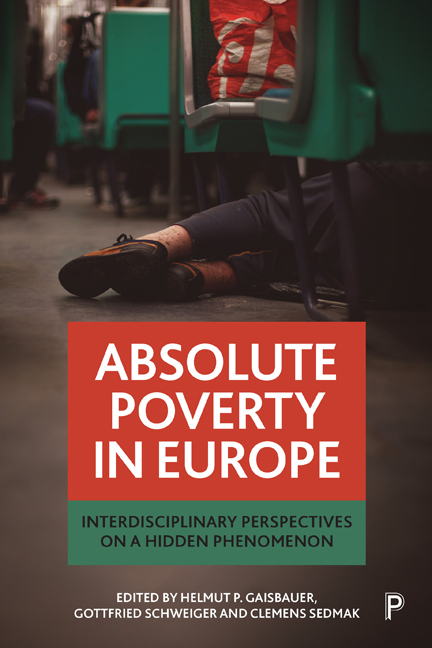Book contents
- Frontmatter
- Contents
- List of figures and tables
- Notes on contributors
- 1 Absolute poverty in Europe: introduction
- Part One Conceptual and methodological challenges
- Part Two Key issues for the absolute poor
- Part Three Policy responses to absolute poverty in Europe
- Part Four Ethical perspectives on absolute poverty in Europe
- Conclusion responding to the dark reality of absolute poverty in European welfare states
- Index
17 - Dignity, self-respect and real poverty in Europe
Published online by Cambridge University Press: 27 April 2022
- Frontmatter
- Contents
- List of figures and tables
- Notes on contributors
- 1 Absolute poverty in Europe: introduction
- Part One Conceptual and methodological challenges
- Part Two Key issues for the absolute poor
- Part Three Policy responses to absolute poverty in Europe
- Part Four Ethical perspectives on absolute poverty in Europe
- Conclusion responding to the dark reality of absolute poverty in European welfare states
- Index
Summary
Introduction
In a speech given in Nairobi in 1973 the then President of the World Bank, Robert S. McNamara, made a strong distinction between absolute and relative poverty. He said:
‘Relative poverty means simply that some countries are less affluent than other countries, or that some citizens of a given country have less personal abundance than their neighbors. […] But absolute poverty is a condition of life so degraded by disease, illiteracy, malnutrition, and squalor as to deny its victims basic human necessities. […] This is absolute poverty: a condition of life so limited as to prevent realization of the potential of the genes with which one is born; a condition of life so degrading as to insult human dignity.’ (McNamara's speech to The Bank's Board of Governors on 24 September 1973)
By now the distinction between relative and absolute poverty, as used by McNamara, is commonplace. Moreover many people seem to believe, as McNamara does, that absolute poverty is very serious, a violation of human dignity even, while relative poverty is not. I do not think that this position is correct. Consequently, this chapter preserves the first part of McNamara's major thesis, and takes issue with the second part. First I defend the claim that absolute poverty is degrading and therefore constitutes a violation of human dignity; I do this by connecting dignity with a certain understanding of self-respect that rests on the ability to take care of oneself in basic matters of life as well as the ability to see and present oneself as a reputable member of society.
Then I take issue with McNamara's implicit claim that relative poverty does not constitute a violation of human dignity, arguing that not only absolute, but also what McNamara and many others call relative poverty is degrading and a threat to human dignity. The difference is rather that absolute poverty threatens dignity in a more fundamental way: absolute poverty threatens the ability to take care of oneself in basic matters of life. Relative poverty threatens the ability to present and see oneself as a reputable member of one's society.
- Type
- Chapter
- Information
- Absolute Poverty in EuropeInterdisciplinary Perspectives on a Hidden Phenomenon, pp. 363 - 382Publisher: Bristol University PressPrint publication year: 2019



